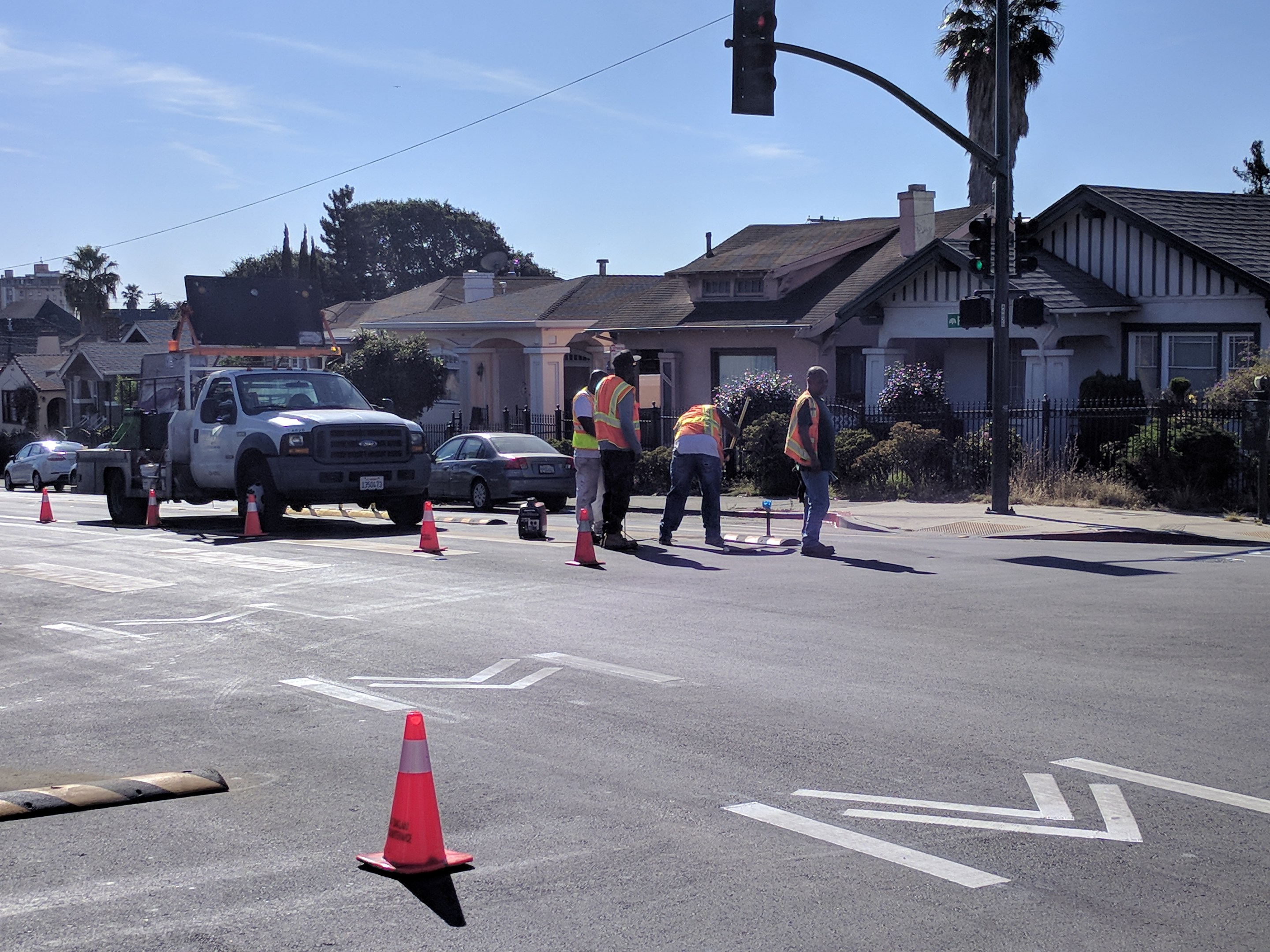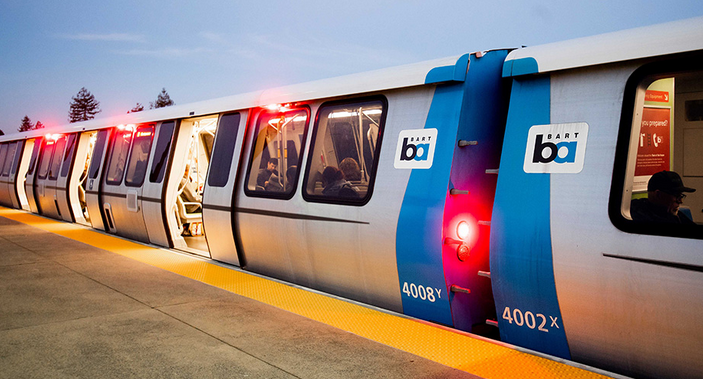Note: Metropolitan Shuttle, a leader in bus shuttle rentals, regularly sponsors coverage on Streetsblog San Francisco and Streetsblog Los Angeles. Unless noted in the story, Metropolitan Shuttle is not consulted for the content or editorial direction of the sponsored content.
Editor's note: on Tuesday I published an "Eyes on the Street," about street treatments on Foothill in front of Garfield Elementary in Oakland. After reviewing it and speaking with OakDOT officials, it became clear that I had jumped the gun: the "rapid response" treatments were not finished and important additions are being added. Thereby, my criticisms were not fully warranted. I decided to take down that post and instead use this new post to update/clarify the status of the project.
OakDOT officials and lawmakers met with parents and faculty Thursday morning at Garfield Elementary to discuss emergency work to make streets safer around the school. "We want to go through the improvements, all of the improvements," said Jason Patton with the Safe Streets Division at the City of Oakland. The installations include speed humps, new signs, daylighting, and "centerline dividers" that encourage cars to make more careful turns. "The underlying ideas are to slow drivers down and make pedestrians more visible, to make them safe."
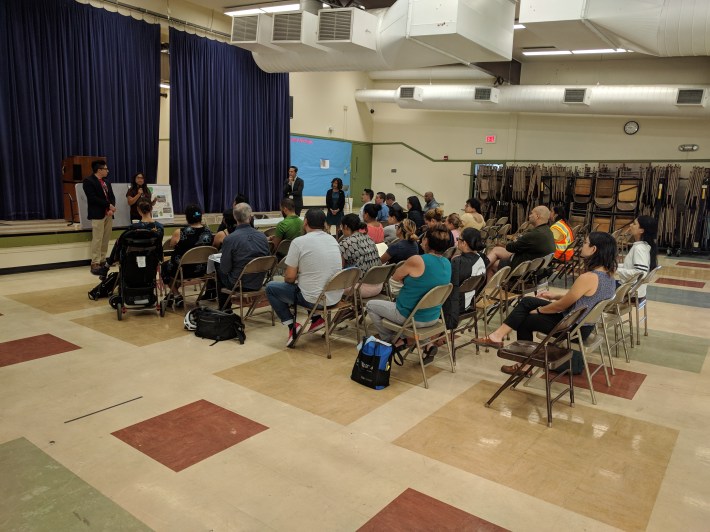
Streetsblog readers will recall that on Oct. 1, a motorist killed Huong Truong, who was crossing Foothill Boulevard at 22nd, just outside the school. Earlier reports said it was a hit-and-run; Sean Fleming, a police official at the meeting, said the driver didn't flee, but was unlicensed. He added that it's now up to the district attorney whether or not to bring charges.
OakDOT officials handed out a flyer to show the work currently underway:
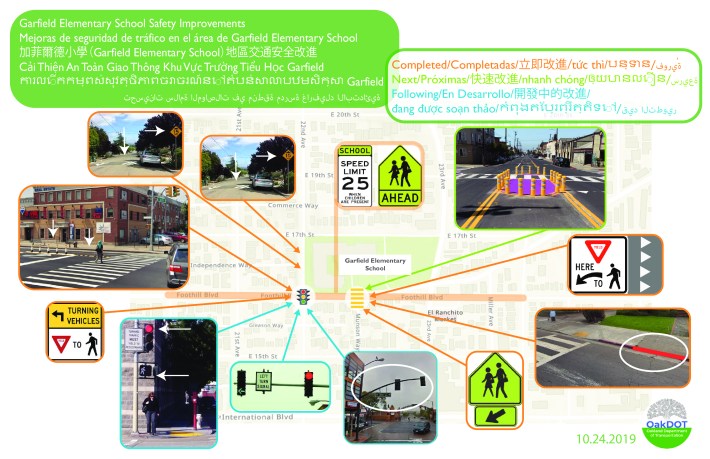
"Work noted in orange is work completed in the last two weeks," explained Patton. "In green is what we’ve committed to do by end of calendar year." Blue, the last category, will take more money, but the idea is to figure out how much and get ready to install those as well, albeit over a longer time frame.
Outside the school, crews had indeed already installed "hardened centerlines" at 22nd. These represent a new treatment for turns in Oakland. The idea is to have a "nose" in front of the crosswalk (to create a bit of a pedestrian refuge) and a row of posts to help stop turning motorists from sweeping across the crosswalks at high speeds (see lead image and image below).
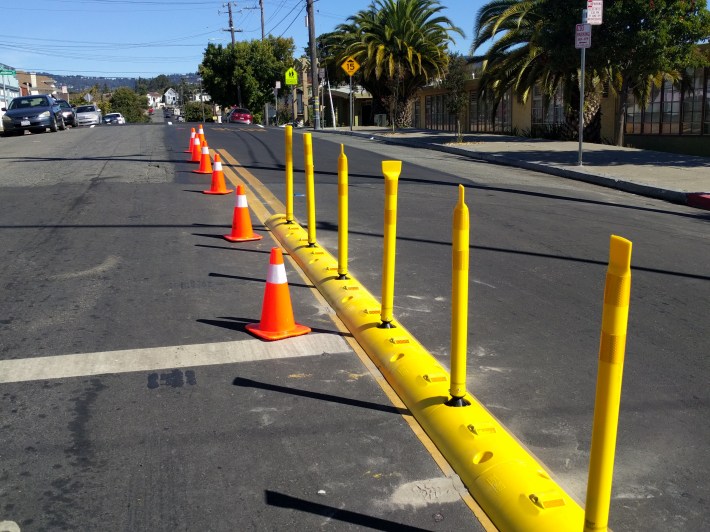
According to OakDOT head Ryan Russo, this is a treatment that has seen success in New York City. These "left-turn traffic calming measures were developed in NYC [and used] at 300 intersections. [They] are proving incredible effective, innovative, and responsive," he told Streetsblog (learn more about this treatment at Streetsblog USA; or New York's DOT has a video showing how they work). Since crews were still out working on them, it was difficult to say how well they will work at this location in Oakland.
In addition, OakDOT has already made upgrades to the crossing at Munson (which is basically a midblock crossing between 22nd and 23rd, leading to a side entrance to the school). They've added more red paint and a plug-in triangular block treatment/delineator to reinforce the sightlines/daylight the crossing, as seen below:
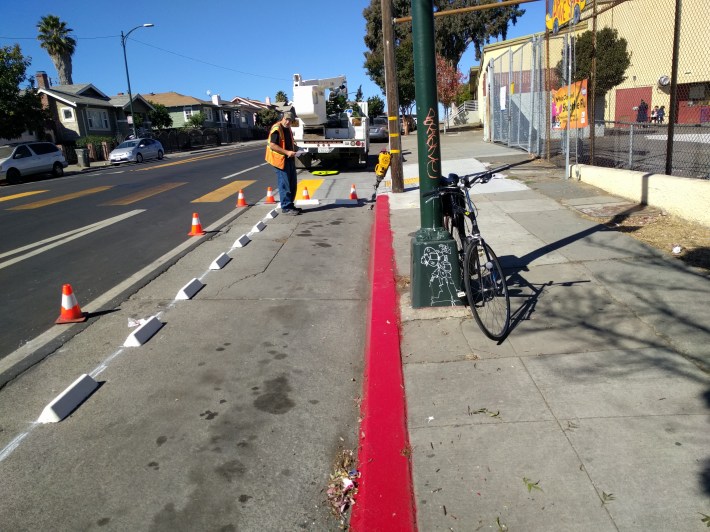
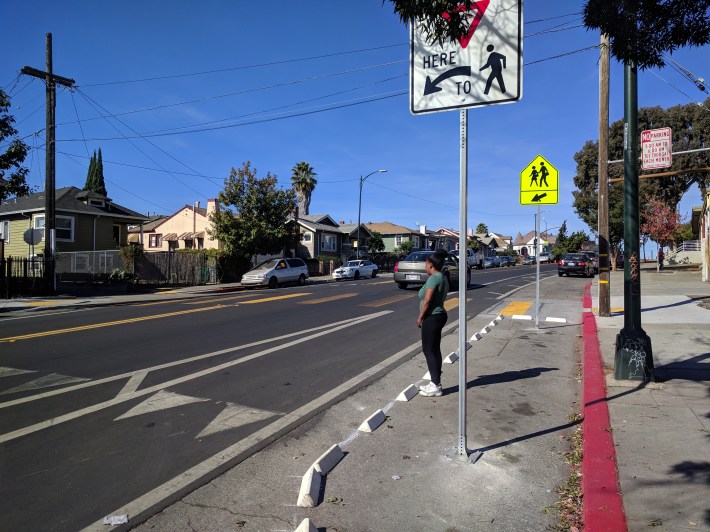
OakDOT also installed speed humps on 22nd. Crews this morning were busy adding thermoplastic white stripes to further highlight them.
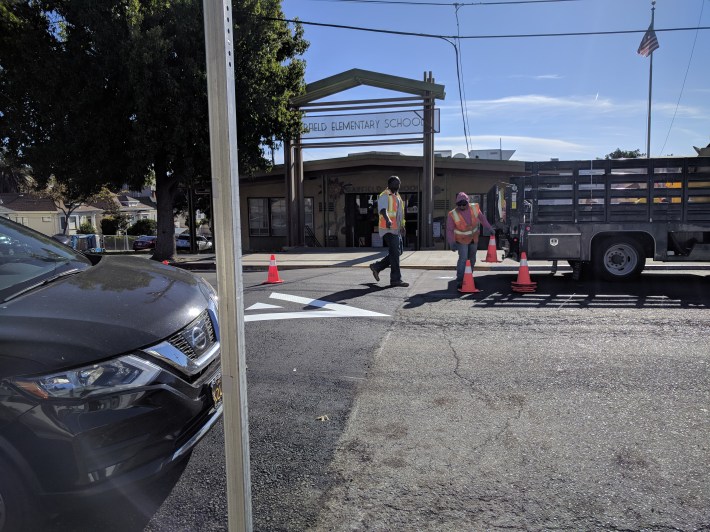
The city has also installed school zone, 25-mph speed limit signs. However, the signs (as can be seen in the diagram five images up) indicate that the 25 mph limit is only the speed limit "when children are present."
"That's wrong and needs to be correct," said District 5 Councilmember Noel Gallo, who was at the meeting. "The speed limit is 25, period, throughout the year, not just when children are present." Parents in the audience also pointed out that sometimes kids are there in the summer and late into the evening. "We need a visual that says 'kids.' I don’t see nothing that says 'stop, because there’s a god damn kid here,'” said a parent who identified herself as Sam. She added that she helps kids cross the street as an unpaid volunteer.
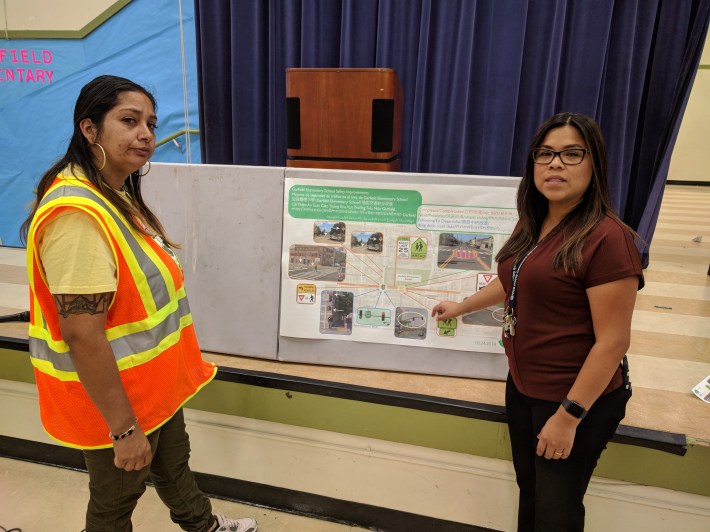
"I still see people flying over the speed humps," said Shamika Lara, mother of two students at Garfield, to Streetsblog. Streetsblog went outside and observed the speed humps directly--indeed, they don't seem to be high enough to really force motorists to slow. As Streetsblog watched, a motorist in a pickup truck raced over one, even with the crew still there adding paint to it.
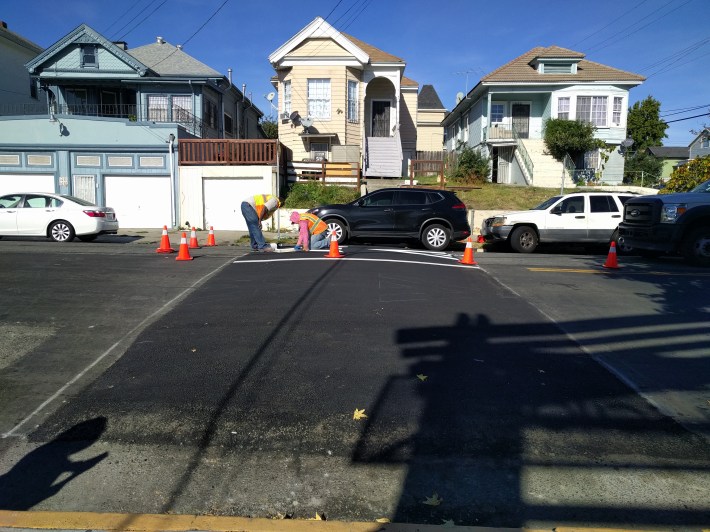
As to improvements that will take a bit longer, the plan is to add a pedestrian refuge eventually at the Munson crossing that will use vertical posts and will resemble the treatments put in at 26th, seen below:
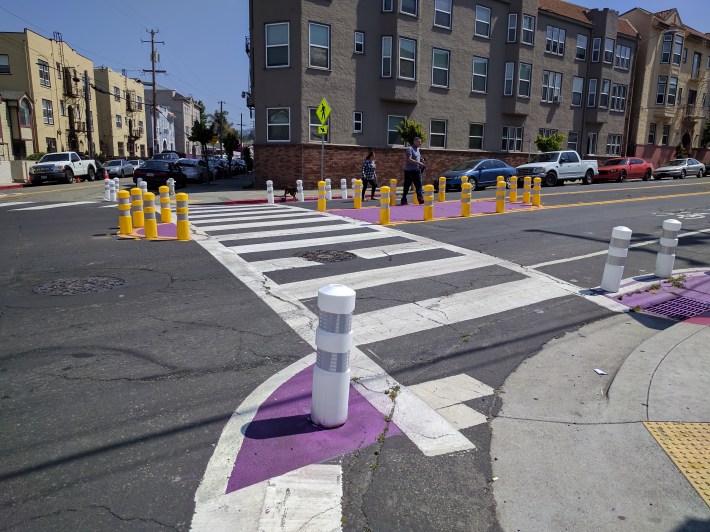
An audience member from "far East Oakland" said he liked that treatment, but would rather see something made of concrete. "All you got to do is hit that and those things fall over," he said. Patton said they hope to add concrete treatments eventually.
He added that the city is looking to add a "leading pedestrian interval" to the signal at 22nd and Foothill. Unfortunately, at the moment that crossing actually releases cars a few seconds before pedestrians, as seen below:
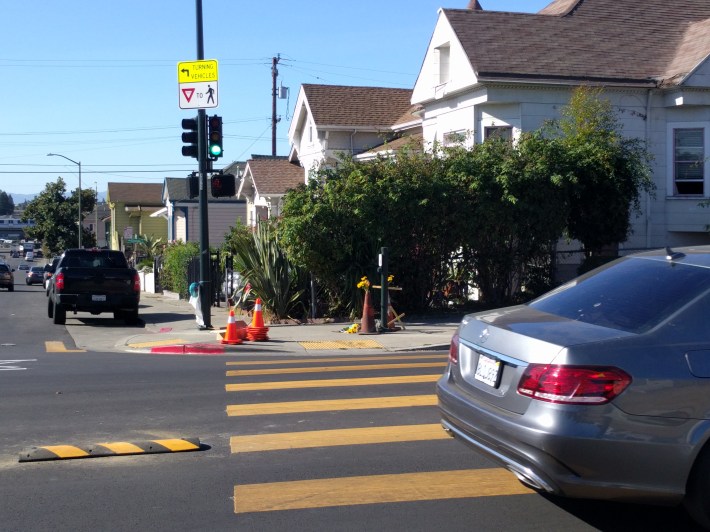
Advocates, meanwhile, took a broader view of the situation on Foothill. Grey Gardner of Transport Oakland, who attended the meeting at Garfield, told Streetsblog that Foothill should have gotten protected bike lanes instead of a 'road diet,' which was installed in May of 2019 from 15th to 23rd.
Bike East Bay's Dave Campbell, who spoke with Streetsblog previously about Foothill, agreed that protected bike lanes and intersections might have prevented this month's tragedy, since they significantly narrow crossing distances for pedestrians.
Politics often makes that impossible, he added. "Don't pretend a four-to-two road diet with bike lanes in the middle of the street is the safest design. But the problem isn't OakDOT. It's the American transportation engineering system. Their hands are still tied by a system of traffic engineering that is so screwed up in this country and prioritizes moving cars, so good people [at DOTs] can't do good things all the time, even when they are trying."
